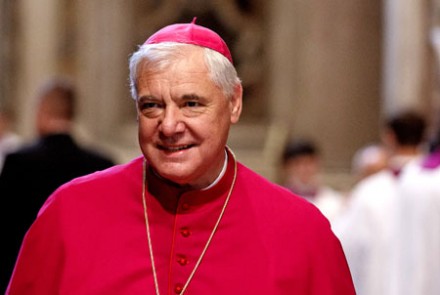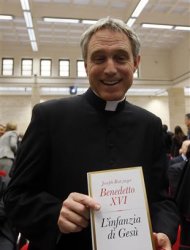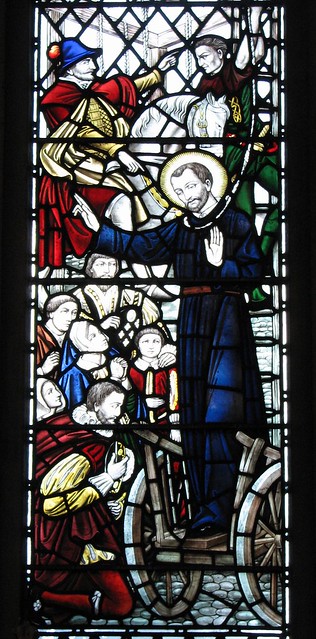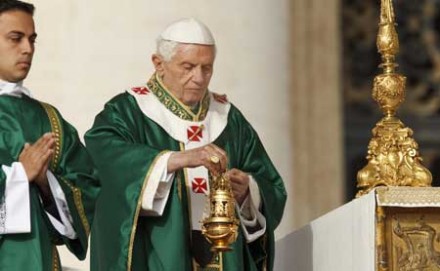“Veritas de terra orta est!” – “Truth has sprung out of the earth” (Ps 85:12).
 The Pope's Urbi et Orbi message:
The Pope's Urbi et Orbi message: Dear brothers and sisters in Rome and throughout the world, a happy Christmas to you and your families!
In this Year of Faith, I express my Christmas greetings and good wishes in these words taken from one of the Psalms: “Truth has sprung out of the earth”. Actually, in the text of the Psalm, these words are in the future: “Kindness and truth shall meet; / justice and peace shall kiss. / Truth shall spring out of the earth, /and justice shall look down from heaven. / The Lord himself will give his benefits; / our land shall yield its increase. / Justice shall walk before him, / and salvation, along the way of his steps” (Ps 85:11-14).
Today these prophetic words have been fulfilled! In Jesus, born in Bethlehem of the Virgin Mary, kindness and truth have indeed met; justice and peace have kissed; truth has sprung out of the earth and justice has looked down from heaven. Saint Augustine explains with admirable brevity: “What is truth? The Son of God. What is the earth? The flesh. Ask whence Christ has been born, and you will see that truth has sprung out of the earth … truth has been born of the Virgin Mary” (En. in Ps. 84:13). (the rest of the article)
OTHER CHRISTMAS MESSAGES:
 Bishop Mark Davies of Shrewsbury: (Midnight Mass)
Bishop Mark Davies of Shrewsbury: (Midnight Mass)Across the centuries Christians have gathered amid the winter darkness and the shadows of night to welcome a Saviour who has been born for us (Luke 2:11). No matter how profound the darkness, how disturbing the shadows all the faithful have recognised on this night: “a great light has shone,” in the words of Isaiah’s prophecy (Isaiah (9:1) that “God’s grace has been revealed,” in St. Paul’s words, “and has made salvation possible for the whole human race” (Titus 2:11); and have heard tonight the timeless message of the angels: “I bring you news of great joy, a joy to be shared by the whole people” (Luke 2:10).
Past generations have gathered in this Cathedral on Christmas night amid many shadows which seemed to obscure the future for them. We think of the ideologies of the past century, Communism and Nazism, which in living memory threatened to shape and distort the whole future of humanity. These inhuman ideologies would challenge, in the name of progress, the received Christian understanding of the sanctity of human life and the family. Winston Churchill, Britain’s war-time Prime Minister, a man without clear, religious belief himself, saw in this deadly struggle nothing less than the defence of Christian civilization. The alternative he vividly described as a dark age made more protracted by the perversion of science. I would appeal to our political leaders this Christmas to similarly glimpse these deeper issues where respect for the sanctity of human life and the authentic meaning of marriage as the foundation of the family are threatened. (the rest of the homily)
Archbishop Nicols attacks governments' gay marriage plans: report from BBC
and High Court Judge criticises governments' plans for gay marriage report from BBC
Archbishop Di Noia on a seldom sung verse of the carol "Joy to the world" here
(Fr Coilin and I met him in the Autumn - he was very good then)









 In 1362, English residents in Rome established a
‘Hospice of the English’ to care for English pilgrims. The Royal Arms of King Henry IV still adorn
your walls to mark the 50th anniversary of that foundation and the
close relationship with the Crown. The
English Hospice was the origin of what has now become the Venerable English
College, following its re-foundation by Pope Gregory XIII in 1579.
In 1362, English residents in Rome established a
‘Hospice of the English’ to care for English pilgrims. The Royal Arms of King Henry IV still adorn
your walls to mark the 50th anniversary of that foundation and the
close relationship with the Crown. The
English Hospice was the origin of what has now become the Venerable English
College, following its re-foundation by Pope Gregory XIII in 1579.










 The theme of marriage, found in the Gospel and the first
reading, deserves special attention. The message of the word of God may
be summed up in the expression found in the Book of Genesis and taken up
by Jesus himself: “Therefore a man leaves his father and his mother and
cleaves to his wife, and they become one flesh” (Gen 2:24; Mk 10:7-8).
What does this word say to us today? It seems to me that it invites us
to be more aware of a reality, already well known but not fully
appreciated: that matrimony is a Gospel in itself, a Good News for the
world of today, especially the dechristianized world. The union of a man
and a woman, their becoming “one flesh” in charity, in fruitful and
indissoluble love, is a sign that speaks of God with a force and an
eloquence which in our days has become greater because unfortunately,
for various reasons, marriage, in precisely the oldest regions
evangelized, is going through a profound crisis. And it is not by
chance. Marriage is linked to faith, but not in a general way. Marriage,
as a union of faithful and indissoluble love, is based upon the grace
that comes from the triune God, who in Christ loved us with a faithful
love, even to the Cross. Today we ought to grasp the full truth of this
statement, in contrast to the painful reality of many marriages which,
unhappily, end badly. There is a clear link between the crisis in faith
and the crisis in marriage. And, as the Church has said and witnessed
for a long time now, marriage is called to be not only an object but a
subject of the new evangelization. This is already being seen in the
many experiences of communities and movements, but its realization is
also growing in dioceses and parishes, as shown in the recent World
Meeting of Families.One of the important ideas of the renewed impulse
that the Second Vatican Council gave to evangelization is that of the
universal call to holiness, which in itself concerns all Christians (cf.
Lumen Gentium, 39-42). The saints are the true actors in evangelization
in all its expressions. In a special way they are even pioneers and
bringers of the new evangelization: with their intercession and the
example of lives attentive to the inspiration of the Holy Spirit, they
show the beauty of the Gospel to those who are indifferent or even
hostile, and they invite, as it were tepid believers, to live with the
joy of faith, hope and charity, to rediscover the taste for the word of
God and for the sacraments, especially for the bread of life, the
Eucharist. Holy men and women bloom among the generous missionaries who
announce the Good News to non-Christians, in the past in mission
countries and now in any place where there are non-Christians. Holiness
is not confined by cultural, social, political or religious barriers.
Its language, that of love and truth, is understandable to all people of
good will and it draws them to Jesus Christ, the inexhaustible source
of new life.
The theme of marriage, found in the Gospel and the first
reading, deserves special attention. The message of the word of God may
be summed up in the expression found in the Book of Genesis and taken up
by Jesus himself: “Therefore a man leaves his father and his mother and
cleaves to his wife, and they become one flesh” (Gen 2:24; Mk 10:7-8).
What does this word say to us today? It seems to me that it invites us
to be more aware of a reality, already well known but not fully
appreciated: that matrimony is a Gospel in itself, a Good News for the
world of today, especially the dechristianized world. The union of a man
and a woman, their becoming “one flesh” in charity, in fruitful and
indissoluble love, is a sign that speaks of God with a force and an
eloquence which in our days has become greater because unfortunately,
for various reasons, marriage, in precisely the oldest regions
evangelized, is going through a profound crisis. And it is not by
chance. Marriage is linked to faith, but not in a general way. Marriage,
as a union of faithful and indissoluble love, is based upon the grace
that comes from the triune God, who in Christ loved us with a faithful
love, even to the Cross. Today we ought to grasp the full truth of this
statement, in contrast to the painful reality of many marriages which,
unhappily, end badly. There is a clear link between the crisis in faith
and the crisis in marriage. And, as the Church has said and witnessed
for a long time now, marriage is called to be not only an object but a
subject of the new evangelization. This is already being seen in the
many experiences of communities and movements, but its realization is
also growing in dioceses and parishes, as shown in the recent World
Meeting of Families.One of the important ideas of the renewed impulse
that the Second Vatican Council gave to evangelization is that of the
universal call to holiness, which in itself concerns all Christians (cf.
Lumen Gentium, 39-42). The saints are the true actors in evangelization
in all its expressions. In a special way they are even pioneers and
bringers of the new evangelization: with their intercession and the
example of lives attentive to the inspiration of the Holy Spirit, they
show the beauty of the Gospel to those who are indifferent or even
hostile, and they invite, as it were tepid believers, to live with the
joy of faith, hope and charity, to rediscover the taste for the word of
God and for the sacraments, especially for the bread of life, the
Eucharist. Holy men and women bloom among the generous missionaries who
announce the Good News to non-Christians, in the past in mission
countries and now in any place where there are non-Christians. Holiness
is not confined by cultural, social, political or religious barriers.
Its language, that of love and truth, is understandable to all people of
good will and it draws them to Jesus Christ, the inexhaustible source
of new life.